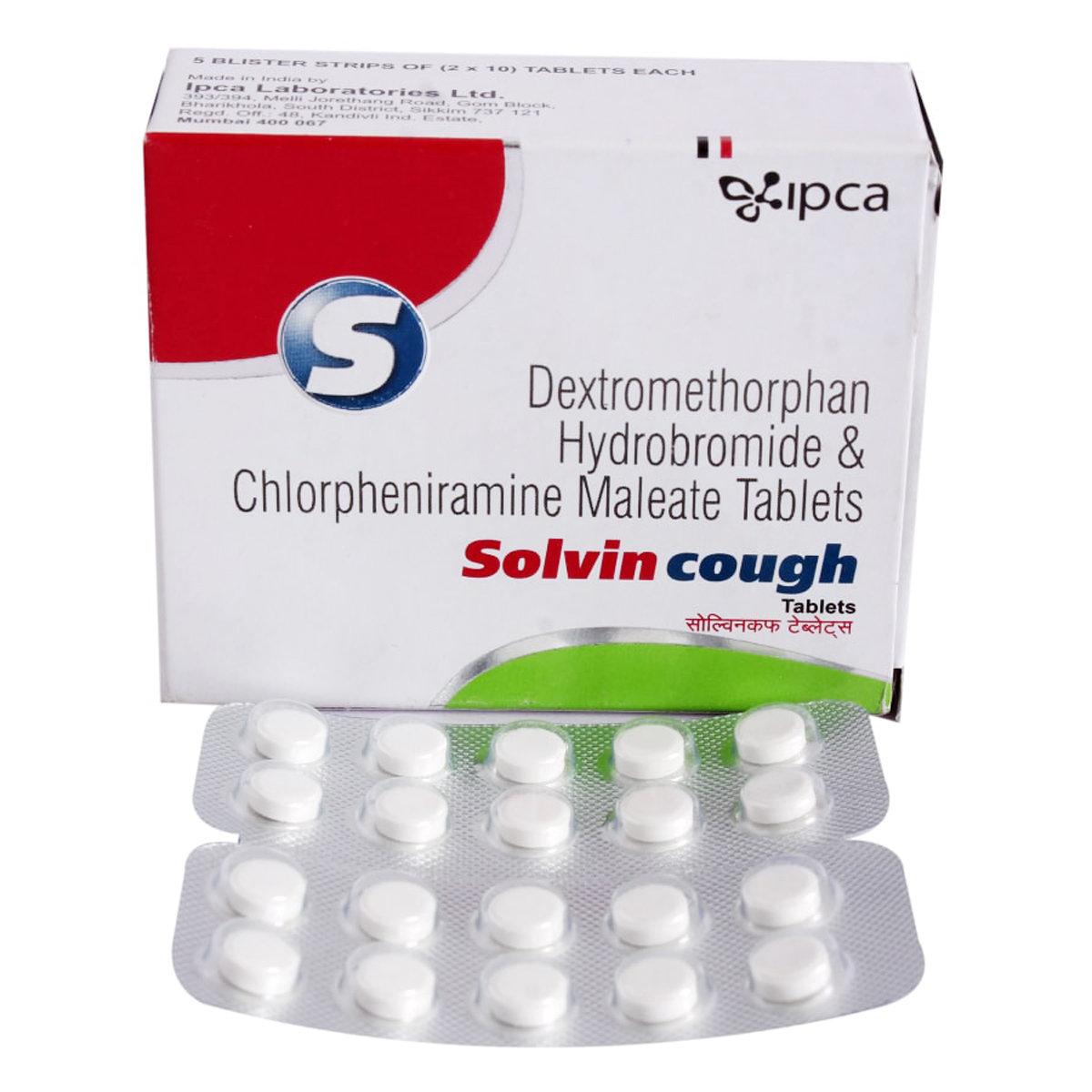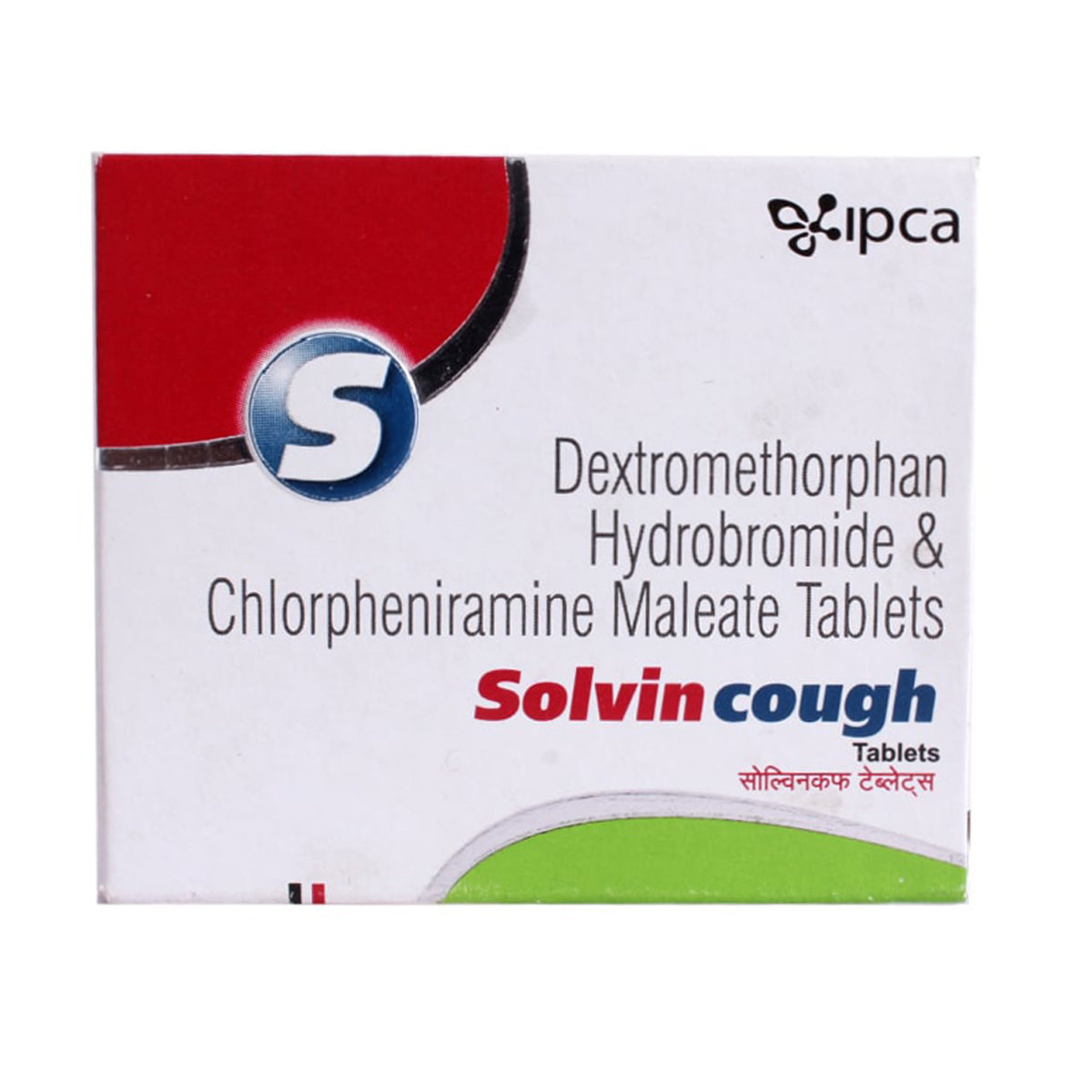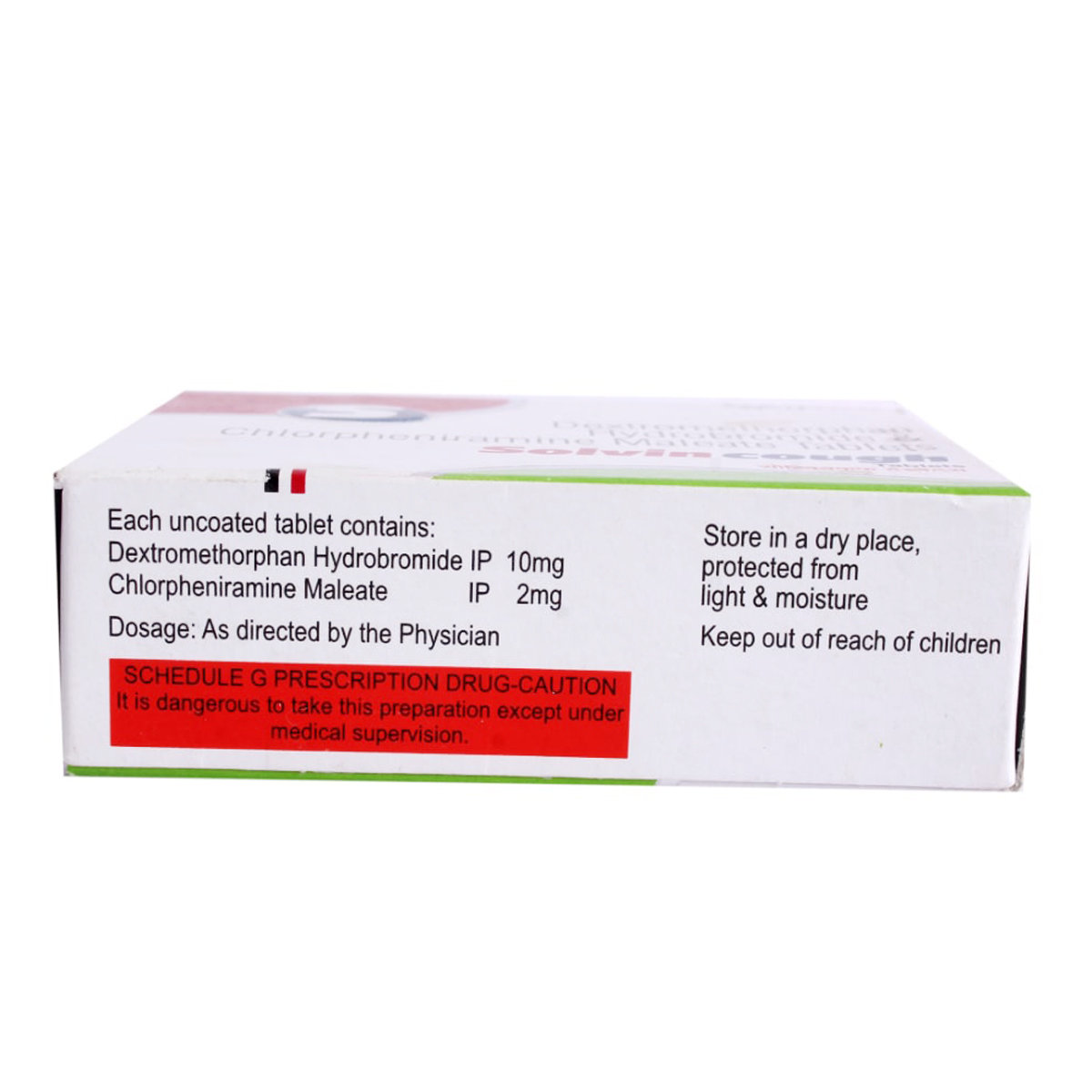Solvin Cough Tablet 10's
MRP ₹79.5
(Inclusive of all Taxes)
₹11.9 Cashback (15%)
Provide Delivery Location
Online payment accepted
 Prescription drug
Prescription drugWhats That
Manufacturer/Marketer :
Consume Type :
Expires on or after :
Return Policy :
About Solvin Cough Tablet
Solvin Cough Tablet belongs to a class of medication called 'cough and cold preparations' primarily used to treat cough due to runny nose, sneezing, and throat irritation. Coughing (dry or productive) is the body's way of clearing irritants (like allergens, mucus or smoke) from airways and preventing infection. There are two types of coughs, namely: Dry cough and chesty cough. A dry cough is tickly and doesn't produce any vicious or thick mucus, while a chesty cough (wet cough) produces mucous or sputum.
Solvin Cough Tablet is a combination of two drugs, namely: Chlorphenamine maleate and Dextromethorphan hydrobromide. Chlorphenamine maleate works by blocking the action of histamine, a substance responsible for causing allergic reactions. Dextromethorphan hydrobromide blocks the transmission of nerve signals from the cough centre in the brain to the muscles that produce cough. Together, Solvin Cough Tablet helps to relieve cough, cold and allergic symptoms.
Your doctor will recommend the dose and duration of Solvin Cough Tablet based on your medical condition. Some people may experience dry mouth/throat/nose, drowsiness, blurred vision, constipation, dizziness, and restlessness. Most of these side effects of Solvin Cough Tablet do not require medical attention and gradually resolve over time. However, if the side effects persist or worsen, please consult your doctor.
If you are pregnant or breastfeeding, it is advised to inform your doctor before starting Solvin Cough Tablet . Solvin Cough Tablet is not recommended for children below 2 years of age. Solvin Cough Tablet may cause dizziness, so drive only if you are alert. Avoid alcohol consumption along with Solvin Cough Tablet as it may cause increased dizziness and drowsiness. Keep your doctor informed about your health condition and medications to rule out any side effects/interactions.
Uses of Solvin Cough Tablet
Directions for Use
Key Benefits
Solvin Cough Tablet is a combination of two drugs: Chlorphenamine maleate (antihistamine) and Dextromethorphan hydrobromide (cough suppressant). Chlorphenamine maleate belongs to the class of antihistamines or anti-allergic that works by blocking the action of histamine, a substance responsible for causing allergic reactions. It helps to provide relief from allergy symptoms such as sneezing, running nose, watery eyes, itching, swelling, and congestion or stiffness. Dextromethorphan hydrobromide belongs to the class of cough suppressants that block the transmission of nerve signals from the cough centre in the brain to the muscles that produce cough. Thus, together Solvin Cough Tablet helps to relieve cough, cold and allergic symptoms.
Storage
- Preventing Vomiting (Before it Happens)
- Take medication exactly as prescribed by your doctor. This can help minimize side effects, including vomiting.
- Having a small meal before taking your medication can help reduce nausea and vomiting.
- Talk to your doctor about taking anti-nausea medication along with your prescribed medication.
- Managing Vomiting (If it Happens)
- Try taking ginger in the form of tea, ale, or candy to help alleviate nausea and vomiting.
- What to Do if Vomiting Persists
- Consult your doctor if vomiting continues or worsens, consult the doctor for guidance on adjusting your medication or additional treatment.
- Inform your doctor about your constipation symptoms. They may adjust your medication or advise alternative treatments.
- Stay hydrated by drinking sufficient of water (at least 8-10 glasses a day) to help soften stool and promote bowel movements.
- Increase fibre intake by eating foods high in fibre, such as fruits, whole grains, vegetables and legumes, to help bulk up the stool.
- Establish a bowel routine by trying to go to the bathroom at the same time each day to train your bowels.
- Engaging in regular exercise, like walking or yoga, can support in bowel movement stimulation.
- Consult your doctor if constipation persists, and discuss alternative treatments or adjustments to your medication.
- Get enough sleep. Maintain a regular sleep cycle.
- Eat a healthy diet and exercise regularly.
- Manage stress with yoga or meditation.
- Limit alcohol and caffeine.
- Avoid driving or operating machinery unless you are alert.
- Inform your doctor about dizziness symptoms. They may adjust your medication regimen or prescribe additional medications to manage symptoms.
- Follow your doctor's instructions for taking medication, and take it at the same time every day to minimize dizziness.
- When standing up, do so slowly and carefully to avoid sudden dizziness.
- Avoid making sudden movements, such as turning or bending quickly, which can exacerbate dizziness.
- Drink plenty of water throughout the day to stay hydrated and help alleviate dizziness symptoms.
- If you're feeling dizzy, sit or lie down and rest until the dizziness passes.
- Track when dizziness occurs and any factors that may trigger it, and share this information with your doctor to help manage symptoms.
- Avoid driving or operating machinery or activities that require high focus until you know how the medication affects you.
- Maintain a fixed sleeping schedule, create a relaxing bedtime routine and ensure your sleeping space is comfortable to maximize your sleep quality.
- Limit alcohol and caffeine as these may worsen drowsiness and disturb sleep patterns.
- Drink plenty of water as it helps with alertness and keeps you hydrated and for overall well-being.
- Moderate physical activity can improve energy levels, but avoid intense workouts right before bedtime.
- Confusion is a major psychotic disorder that needs immediate medical attention.
- Acknowledge your experience and put effort to control confusion.
- Avoid smoking and alcohol intake as it can worsen the condition and increase your confusion.
- Practice meditation and yoga to avoid anxiety, which can be one of the leading causes.
- Talk to your dietician and consume food that can improve your mental health.
Drug Warnings
Do not take Solvin Cough Tablet if you are allergic to any of the contents. Avoid using Solvin Cough Tablet if you have taken medicines such as linezolid, phenelzine, selegiline, rasagiline, isocarboxazid, tranylcypromine, and methylene blue injection in the past 14 days. It is advised to seek medical help if the cough does not go away or if it is followed by a high fever, skin rash, or persistent headache. Solvin Cough Tablet may cause drowsiness, dizziness, and blurred vision in some patients; therefore, drive only if you are alert. Solvin Cough Tablet should not be used in elderly patients with confusion. Avoid alcohol consumption along with Solvin Cough Tablet as it might cause increased dizziness.
Drug-Drug Interactions
Drug-Drug Interactions
Login/Sign Up
Taking Solvin Cough Tablet and Potassium citrate (in tablet or capsule form) together can increase the risk of stomach ulcers, bleeding, and gastrointestinal injury.
How to manage the interaction:
Taking Solvin Cough Tablet with Potassium citrate is not recommended as it can lead to an interaction, it can be taken if prescribed by the doctor. However, if you experience any symptoms such as severe stomach pain, bloating, lightheadedness or dizziness, nausea, vomiting (especially with blood), decreased hunger, or dark, tarry stools, consult the doctor immediately. Do not discontinue any medications without a doctor's advice.
Taking Solvin Cough Tablet and Potassium chloride (in tablet or capsule form) together can increase the risk of stomach ulcers, bleeding, and gastrointestinal injury.
How to manage the interaction:
Taking Solvin Cough Tablet with Potassium chloride it not recommended as it can lead to an interaction, it can be taken if your doctor has prescribed it. However, if you experience any symptoms such as severe stomach pain, bloating, lightheadedness or dizziness, nausea, vomiting (especially with blood), decreased hunger, or dark, tarry stools, consult the doctor. Do not discontinue any medications without a doctor's advice.
Co-administration of Solvin Cough Tablet and Selegiline may increase the risk of serotonin syndrome (a condition in which a chemical called serotonin builds up in your body).
How to manage the interaction:
Co-administration of Selegiline with Solvin Cough Tablet can possibly result in an interaction, but it can be taken if a doctor has advised it. If you notice any of these symptoms - confusion, hallucination, fits, increased heart rate, fever, excessive sweating, shivering, shaking, blurred vision, muscle spasm, stiffness, incoordination, stomach cramps, nausea, vomiting, or diarrhea - make sure to contact a doctor right away. Do not stop using any medications without talking to a doctor.
Taking Tranylcypromine with Solvin Cough Tablet can increase the risk of serotonin syndrome (a condition in which a chemical called serotonin increases in your body).
How to manage the interaction:
Taking Solvin Cough Tablet with Tranylcypromine is not recommended, but can be taken together if prescribed by a doctor. However, consult a doctor if you experience confusion, hallucination(seeing and hearing things that do not exist), fit blood pressure alteration, increased heart rate, fever, excessive sweating, shivering or shaking, blurred vision, pain in the muscles or stiffness, incoordination, stomach cramps, nausea, vomiting, and diarrhea. Do not discontinue any medications without consulting a doctor.
Co-administration of Phenelzine and Solvin Cough Tablet can increase the risk of serotonin syndrome (A condition in which a chemical called serotonin builds up in your body).
How to manage the interaction:
Co-administration of Phenelzine and Solvin Cough Tablet can lead to an interaction. However, if you experience any symptoms like confusion, hallucination, seizure, changes in blood pressure, increased heart rate, fever, excessive sweating, shivering or shaking, blurred vision, muscle stiffness, tremors, stomach cramps, nausea, vomiting, and diarrhea, consult a doctor immediately. Do not stop using any medications without a doctor's advice.
Co-administration of Isocarboxazid with Solvin Cough Tablet can increase the risk of serotonin syndrome (A condition in which a chemical called serotonin builds up in your body).
How to manage the interaction:
Taking Solvin Cough Tablet and Isocarboxazid can lead to an interaction. However, if you experience any symptoms like confusion, hallucination, seizure, changes in blood pressure, increased heart rate, fever, excessive sweating, shivering or shaking, blurred vision, muscle stiffness, tremors, stomach cramps, nausea, vomiting, and diarrhea, consult a doctor immediately. Do not stop using any medications without a doctor's advice.
Co-administration of Pargyline and Solvin Cough Tablet can increase the risk of serotonin syndrome (A condition in which a chemical called serotonin builds up in your body).
How to manage the interaction:
Co-administration of Solvin Cough Tablet and Pargyline can lead to an interaction. However, if you experience any symptoms like confusion, hallucination, seizure, changes in blood pressure, increased heart rate, fever, excessive sweating, shivering or shaking, blurred vision, muscle stiffness, tremors, stomach cramps, nausea, vomiting, and diarrhea, consult a doctor immediately. Do not stop using any medications without a doctor's advice.
Co-administration of Solvin Cough Tablet and Procarbazine may increase the risk of serotonin syndrome (a condition in which a chemical called serotonin builds up in your body).
How to manage the interaction:
Co-administration of Procarbazine with Solvin Cough Tablet can possibly result in an interaction, but it can be taken if a doctor has advised it. If you notice any of these symptoms - confusion, hallucination, seizure, increased heart rate, fever, excessive sweating, shivering, shaking, blurred vision, muscle spasm, stiffness, incoordination, stomach cramps, nausea, vomiting, or diarrhea - make sure to contact a doctor right away. Do not stop using any medications without talking to a doctor.
Taking Rasagiline with Solvin Cough Tablet can increase the risk of serotonin syndrome (A condition in which a chemical called serotonin increase in your body).
How to manage the interaction:
Taking Solvin Cough Tablet with Rasagiline is not recommended as it can possibly result in an interaction, it can be taken if a doctor has advised it. If you notice any of these symptoms like confusion, hallucination, fits, extreme changes in blood pressure, increased heart rate, fever, excessive sweating, shivering or shaking, blurred vision, muscle spasm or stiffness, shaking, incoordination, stomach cramps, nausea, vomiting, and diarrhea, consult a doctor. Do not discontinue any medications without consulting a doctor.
Co-administration of Solvin Cough Tablet with Isocarboxazid can increase the risk of side effects.
How to manage the interaction:
Taking Solvin Cough Tablet with Isocarboxazid can result in an interaction, but it can be taken if your doctor has advised it. However, if you have any of these symptoms - dizziness, drowsiness, confusion, disorientation, memory problems, blurred vision, dry mouth, constipation, heat intolerance, flushing, decreased sweating, difficulty urinating, rapid heartbeat, - make sure to consult the doctor right away. Do not stop using any medications without talking to a doctor.
Drug-Food Interactions
Drug-Food Interactions
Login/Sign Up
Diet & Lifestyle Advise
- Avoid dairy products such as milk as they may increase mucus production. Also, avoid processed or refined foods. Instead, replace baked foods, fried foods, white bread, white pasta, french fries, sugary desserts, and chips with green leafy vegetables.
- Drink plenty of fluids to avoid a dry throat. It also helps loosen mucus.
- Avoid citrus fruits as they may worsen the cough.
- Eat fruits rich in water content, such as pears, watermelon, peaches, and pineapples.
Side Effects of Solvin Cough Tablet
- Dry mouth, throat or nose
- Drowsiness
- Blurred vision
- Constipation
- Dizziness
- Restlessness
Habit Forming
Therapeutic Class
All Substitutes & Brand Comparisons
Author Details
We provide you with authentic, trustworthy and relevant information
Drug-Diseases Interactions
Drug-Diseases Interactions
Login/Sign Up
FAQs
Drug-Drug Interactions Checker List
- DIPHENHYDRAMINE
- ESCITALOPRAM
- DESVENLAFAXINE
- VILAZODONE
Special Advise
- Talk to your doctor if the symptoms do not improve even after taking Solvin Cough Tablet for 7 days.
- Contact a doctor immediately if you develop fever, rash, or headache after taking Solvin Cough Tablet .
- If you are about to undergo any medical tests or surgery, please inform your doctor that you are taking Solvin Cough Tablet .
Disease/Condition Glossary
Cough: Coughing is the body's way of clearing irritants (like allergens, mucus, or smoke) from airways and preventing infection. Cough may be dry or productive. A productive cough (wet cough) brings up sputum (phlegm, mucus, and other matter) from the lungs. A dry cough does not produce any mucus or phlegm. It usually occurs due to irritation in the airways. Cough is commonly caused as a response to allergy or viral infection but coughing up mucus is possibly an indication of infection in the respiratory tract.

Have a query?
Alcohol
Safe if prescribed
Solvin Cough Tablet may increase the effects of alcohol, so it is advised to avoid alcohol consumption.
Pregnancy
Consult your doctor
Consult a doctor if you have any concerns regarding this. Your doctor will prescribe only if the benefits outweigh the risks.
Breast Feeding
Consult your doctor
Please consult a doctor if you have any concerns. Your doctor will decide if Solvin Cough Tablet can be taken by breastfeeding mothers or not.
Driving
Safe if prescribed
Solvin Cough Tablet may cause dizziness and drowsiness. Therefore, drive only if you are alert after taking Solvin Cough Tablet .
Liver
Consult your doctor
Take Solvin Cough Tablet with caution, especially if you have a history of liver diseases/conditions. The dose may be adjusted by your doctor as required.
Kidney
Consult your doctor
Take Solvin Cough Tablet with caution, especially if you have a history of kidney diseases/conditions. The dose may be adjusted by your doctor as required in severe kidney disease.
Children
Safe if prescribed
Solvin Cough Tablet is not recommended for children below 2 years of age. However, it can be used by children older than 2 years of age if prescribed by a child specialist.









_0.jpg?tr=q-85)

